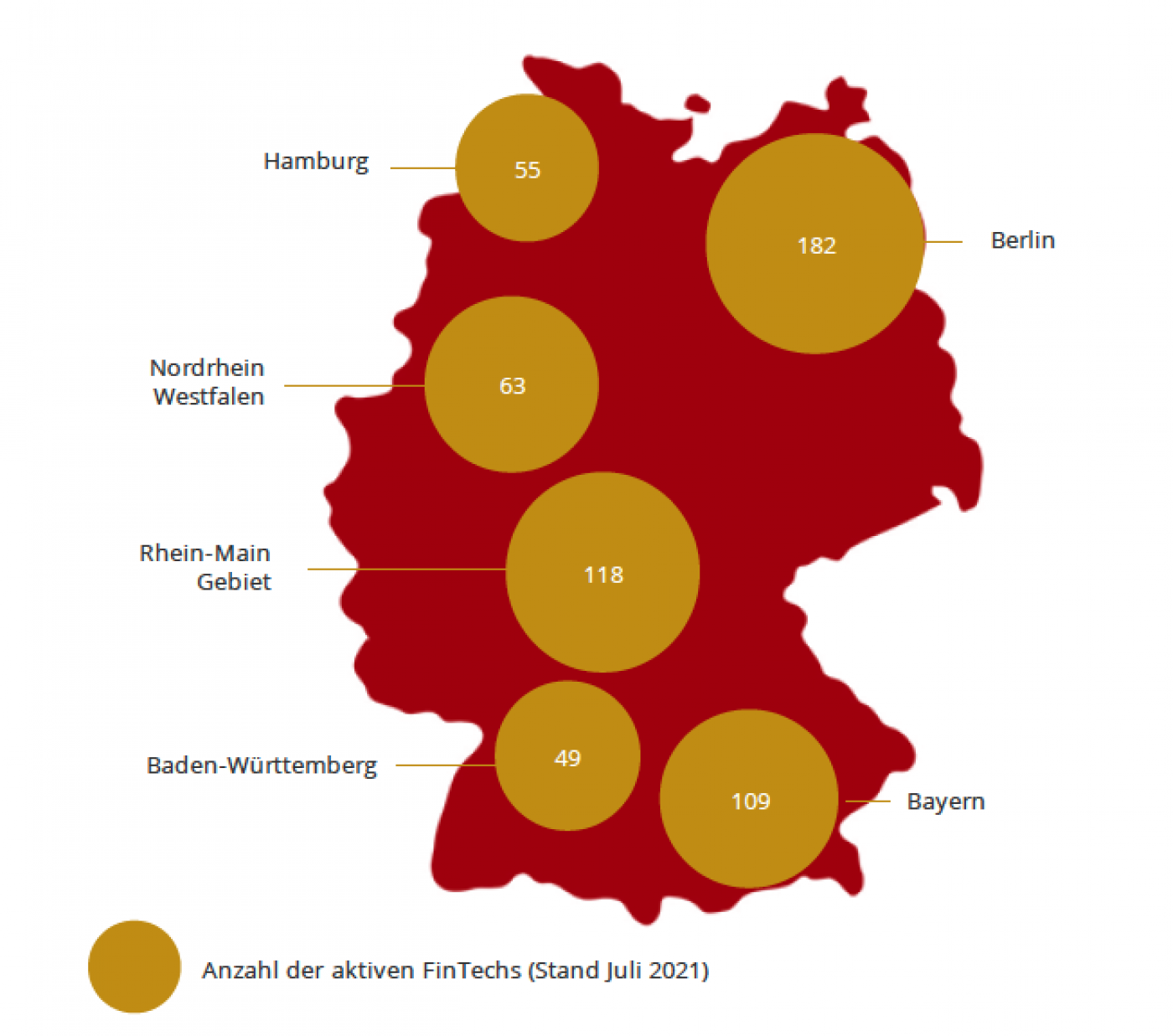So bescheinigt die Studie Hamburg eine besonders junge und dynamische Fintech-Szene: 61 Prozent der Fintechs in Hamburg sind jünger als fünf Jahre. Laut dem Fintech Report widmen sich die jungen Unternehmen vor allem dezentralisierten Finanzdienstleistungen („Defi“), die auf der Blockchain-Technologie basieren. Zwischen 2018 und 2020 wurden in Hamburg 27 neue Fintechs gegründet. Dies entspreche 17 Prozent aller Startup-Gründungen in diesem Zeitraum. Insgesamt seien aktuell 55 Fintechs in Hamburg aktiv (Stand 31. Juli 2021) – die meisten als Single-Service-Provider. Heißt: Diese Fintechs beschäftigen sich mit einem spezifischen Produkt und sind nicht in mehreren Geschäftsfeldern aktiv. Damit reihe sich Hamburg in den bundesweiten Trend ein. Besonders stark vertreten seien in der Hansestadt die Bereiche Credit & Factoring (20 Prozent, deutschlandweit: 7 Prozent) und Personal Financial Management (18 Prozent).
Hamburg is one of six large fintech hubs and is increasingly attracting young financial technology start-ups in particular, according to Germany Finance, the consortium of financial centres in Germany and initiator of the German Fintech Report 2021. Around 243 fintech start-ups were founded between 2018 and 2020 bringing the total to 639 in 2021 or 10 per cent of all start-ups in Germany, it said.
55 aktive Fintechs in Hamburg

Hamburger Fintechs: Finanzierungsaktivitäten und Kapitalzugang
Auch bei den Themen Finanzierungsaktivitäten und Kapitalzugang kann Hamburg punkten: In der Elbmetropole sei der „höchste Anteil frühphasiger Finanzierungen“ in Hamburg zu beobachten, so die Studie weiter. 72 Prozent der Kapitaltransaktionen würden auf Fintechs entfallen, die jünger als fünf Jahre seien. Generell passieren in den Fintech-Hubs Hamburg und Berlin – im Vergleich zur Anzahl der ansässigen Fintechs – überproportional viele Kapitaltransaktionen. Während Hamburg die meisten jungen Fintechs verzeichnet, beherbergt Berlin mit einem Anteil von 28 Prozent die meisten Fintechs deutschlandweit. Im Vergleich dazu befindet sich in Baden-Württemberg der kleine deutsche Fintech-Hub.

Vibrant Hanseatic fintech ecosystem
The Hamburg Metropolitan Region's financial sector is a driving force with round 10,000 companies and over 50,000 employees. Innovation meets tradition with a steadily growing fintech scene driving the digitalisation of the financial sector as exemplified by the smartphone, sustainable bank Tomorrow. A "Hamburg Financial Industry Master Plan 2021-2025", passed in autumn 2021, provides for the explicit promotion of fintechs in Hamburg to bind them to the region through a fintech accelerator among other means. The Fintech Agency, launched by Finanzplatz Hamburg e. V. and Hamburg Invest, serves as a the main point of contact and network for fintechs all over Germany and abroad.
Fintech Week
Hamburg is gearing up to host this year's Fintech Week (#fwhh21) from November 22-26 after the pandemic forced its cancellation in 2020. Fintech Week acts as an umbrella for a wide variety of events including meet-ups, workshops and conferences all of which will be held under 2G rules meaning only fully-vaccinated or recovered persons can attend. Tickets for the entire week are not availalabe as delegates put together their own schedule, according to the organisers Finletter and Fintech Week GmbH.
sb/pb
Sources and further information
- German Fintech Report 2021
- germany-finance.com
- finanzplatz-hamburg.com
- fintech-hamburg.com
- Fintech Agency
- fintechweek.de
German Fintech Report 2021
Germany Finance, the working group of the financial centres in Germany, published the first German Fintech Report in October 2021. It provides information on the diversity of the German fintech industry and where its focus lies based on data by Startbase, which is operated by the Stuttgart Stock Exchange Group.
Germany Finance
Germany Finance is a platform of all regional German financial centres and in close co-operation with the German Ministry of Finance and GTAI, the common goal is to strengthen Germany as a financial centre n the European and international context, to give it a face and to be a point of contact for everyone interested in Germany as a financial center.
More
Similar articles

Hamburg tops Global Fintech Index as growth hub


